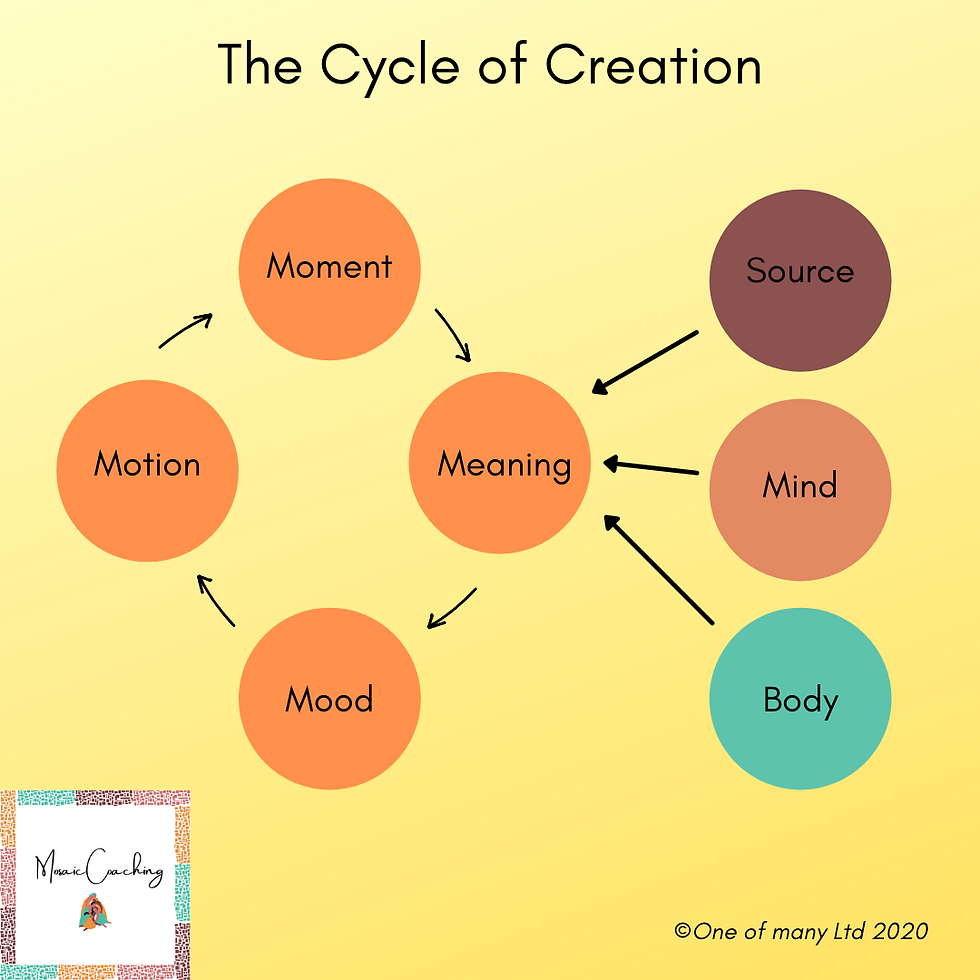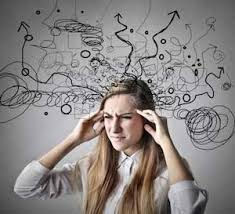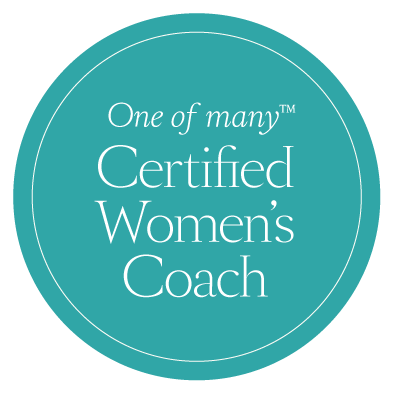Get Out of Your Own Way…in Lockdown?!
- Christine El Issa

- Feb 9, 2021
- 10 min read
Updated: Feb 10, 2021

I don’t know about you, but I’m finding this second lockdown in the UK even more difficult than the first one. With another long period of home schooling PLUS the darkness and cold of winter, I'll be completely honest with you: I’m having a hard time getting out of bed some days. I definitely can’t be arsed to put on anything except pyjamas most days. I think I’ve seriously underestimated how challenging it would be, thinking that we’ve done this before, no problem. It’s winter anyway and we don’t tend to go out much, no big deal, right? Oh, how wrong I was! Just me, right?
It’s hit me recently that the temptation to continue to give into melancholy, laziness or full-on negativity and hopelessness is just too strong and when that happened, I felt this opposing urge to finally start fighting it. I’ve been pleasantly surprised that finally, my brain is starting to shift as I remind myself to go back to basics and use the tools I’ve learned. Perhaps I’ve had enough of too much TV and a weird sleep cycle.
I’ve let things slide for far too long—and it’s not my Inner Critic saying this to me, it’s my PowerTypes. They’re gently reminding me that I do have the strength to keep going, that I am good enough and that there’s plenty happening which is making me (and all of us) extra tired, frustrated and de-motivated—and that’s ok. But I can make some small efforts and what’s more, my family and I deserve those small efforts and to celebrate when they happen.
As we know, life can be challenging, even before we’d ever heard of Covid-19. Life isn’t fair, and certainly not everyone has the same opportunities to grow, thrive, succeed, or maintain a healthy life. There are systemic barriers of inequality based on gender, ethnicity, nationality, sexuality, ability, income, and the list goes on. We are each only responsible for managing the cards we’re dealt in life to the best of our abilities, and there’s a lot that determines what those abilities are (again: family of origin, opportunities, intelligence, resilience, health, income and education, among other things).
Today I want to look at one thing that we do have control over, and which can often be one of the biggest barriers to moving forward: our own thoughts. There has been plenty written about the subject, with such titles as The Power of Positive Thinking (Norman Vincent Peale, 1952). The coaching world is full of self-help leaders who focus on positive thinking as a way to solve all of one’s problems. Just to be clear, I can see the merits of these teachings on the surface, but there are limitations to them. In some cases, they have been downright harmful to people. I’ll explain.
At One of Many, we use 15 Soft Power Principles which help us address our connection to our ourselves, others and Source (our spirituality). You can read more about this idea of Soft Power in my earlier post here.
So with this topic in mind, it makes sense for us to look at two of those Soft Power Principles which deal with our own minds:
When I first heard this, I could easily get on board with number 4, because sure, we do have control over our thoughts. Number 5, on the other hand, gave me pause. What on earth do they mean, my thoughts create my destiny? Is this some New Age thing? I think there's a fine line between the benefits of positivity and magical thinking, so what is this all about?
As it turns out, our thoughts do influence our moods and actions. In turn this affects outcomes. We call this the Cycle of Creation. Note that the credit for this representation goes to One of Many®.

This model is also consistent with what I learned about Family Systems Theory when I was doing my training in Eco-Systemic Structural Family Therapy, developed by Salvador Minuchun. This was in the context of family dynamics and the way groups of people interact with and affect each other. The difference is that this is about us as individuals.
Looking at the graphic above, let's start at a 'moment' in time. Something happens which causes some sort of reaction in us. For example, you walk into the kitchen for your 20th snack of the day, as you do in lockdown, and you see that the sink is piled full of dishes. There's nothing to make dinner. What happens next, in your mind, is the 'meaning' you make of it--the interpretation your brain gives to their actions.
This meaning is impacted by three factors as you see above: Source, mind and body. First, our spiritual beliefs influence the way we look at the world and what happens around us. The language we use might vary between 'God's will,' 'divine intervention,' 'fate,' or 'chance.'

Second, our bodies impact the way we interpret these moments. If we've not been feeling well due to a headache or lack of sleep, or if we're at a certain time in our cycle (you know when, if this applies to you), we might feel grumpier than normal. If we haven't eaten properly or if the weather is too hot or cold, all of this affects our bodies and in turn affects the way we react to situations. If we've been cooped up at home for weeks on end because of Covid-19 and it's the UK winter with very little daylight...well, that certainly has an impact, too.

Lastly, our thoughts significantly impact the meaning we make to life events. This includes our thoughts in the moment as well as our underlying beliefs and values. This is where we want to focus today, so that we can begin to understand limiting beliefs.

In the example above, let's consider two possible meanings you might make of the event. Perhaps you are normally quite organised at home, and maybe you have plenty of positive self-esteem and confidence, fully aware and accepting of your place in the world. You remember that it's 2021 and we've all been living with Covid-19 for a year, and you give yourself a break because you know you're doing the very best that you can.
Alternatively, maybe you do not have particularly good organisational skills and you're not great at meal planning. Maybe you also have lower confidence and an underlying belief (a limiting belief) that you're not 'good enough.' Maybe your Inner Critic or Imposter Syndrome show up. Interpreting this situation, you say to yourself 'I've been home all week and yet I can't get any cleaning or meal prep done. I'm completely useless.'
What happens next is the 'mood,' or emotional response you begin to feel as a result of the 'meaning' you have made of the 'moment.' If your interpretation was a positive assumption about yourself and the reality of Covid-19, you might feel compassion toward yourself. If your interpretation was a negative assumption about how you are 'useless,' you might begin to feel sad or upset.
Finally, the emotional response leads us to the 'motion,' or reaction, to the event. In the first example, you might respond by remembering to take care of yourself, maybe having a go at the dishes and maybe having a laugh about it later with a friend who did the same thing. In the second example, you might sob at the sink while you do the dishes and eat your weight in biscuits and tea for the rest of the afternoon...and then feel guilty about it afterwards.
All of this happens in a matter of seconds, and our thoughts might be completely unconscious at first. As we think about our example, the dishes don't always get done and it's annoying to have to plan and prepare all 3 meals every single day for weeks on end. We are all struggling with the isolation of Covid-19 one way or another. What matters is the meaning you made of the situation, the emotional response you had and your reaction to the emotion.
While we may not be able to control some of the factors in the above example as a lot of it has to do with the external stress of the pandemic, we can certainly change our thought processes. We can work to manage our Inner Critic and we can also learn to live with or reduce Imposter Syndrome. We can change the way we respond to emotions, but we can't necessarily control our emotions. So let's look at our minds a little deeper.
What are limiting beliefs? They are essentially thoughts that we have (usually about ourselves or 'the way life is') which we believe to be true and which generally limit us in some way. Most are developed in childhood and while this is not about blaming our parents for their real or perceived failures, it does make sense to reflect on the impact of our early experiences. It's also not just about our parents, but about others who had influence over our young lives such as teachers, coaches, siblings, classmates, neighbours and extended family. These beliefs might also develop from significant or traumatic experiences.

Limiting beliefs can be really sneaky, because we might not realise that we have them. They could be in our unconscious mind, connected to deeply painful emotions from past experiences. They are powerful because they are often about fundamental aspects of who we are as a person: our identity or our value. They can work like a self-fulfilling prophecy. The key is to understand that they are not the truth.
So how do we get out of our own way? How can we deal with powerful, deeply held beliefs, possibly lies about ourselves, which we may not even realise we're holding onto? First, we start to identify them. They might be hidden at the moment, but with some digging and reflection, we can uncover them. That alone starts to reduce the power they hold over us.
The best place to start is trigger tracking. What tends to set you off? What emotions do you experience often, or not at all? We can take nearly any 'moment' in our lives which resulted in a negative behaviour and track our way back through that response to the emotion behind it and then begin to look at what meaning we gave to a situation. It's difficult to do in the moment, so reflecting afterwards is key. With trigger tracking, you can start to notice patterns and begin to connect the dots.
Once you've identified a limiting belief, it's time to challenge it and release it. Ask some important questions:

When did you decide that? This helps you to reflect on how long this has been an issue for you. It's quite likely to go back to your childhood. You might even be able to pinpoint the particular event or interaction which cause you to think this negative thing about yourself.
Did you ever not believe it? This helps you to think about the time before and after the development of this limiting belief, if you're able to. Don't worry if you're not sure or can't remember clearly, as this is still useful information.
Do you know anyone who doesn't think that's the truth? Given that this limiting belief is quite likely not the truth, there is probably at least one person who loves you who does not believe this about you. The tricky part is that at the moment, you do believe this particular thing about yourself...or at least a part of you does.
What's the consequence of you believing that? This helps you to consider the price that this limiting belief is costing you. In what way is this belief holding you back? Perhaps you don't put yourself 'out there' in certain situations, or you don't apply for certain positions at work. It might be costing you real money, growth, connection with others, or your physical and/or mental health.
What could you believe instead? While it might be easy to come up with a statement that is simply the opposite of the limiting belief, it is important to think about something you can actually believe is true. It's about being both hopeful and realistic.
What would happen if you did believe that instead? This helps you begin to shift your thinking to consider whether the risk of believing something new outweighs the terrible price you've been paying with the limiting belief. You might succeed at something because you decided to try. You might be triggered less often. Your relationships might improve.

We can't always just change our thinking at the drop of a hat. This process takes hard work and reflection. It isn't as simple as thinking our way to a new belief, we must feel it as well. We must release the limiting belief in order to replace it with the new one.
I use a guided meditation with my clients who identify a limiting belief they feel is no longer serving them. We call it a release process. It's not magical and it's not usually a dramatic shift straight away, but I can say from personal experience that it does work. The impact is often more subtle, and the shift can happen slowly over time. It can help to do the release process more than once as needed (rinse and repeat), but each time it helps to bring a deeper level of awareness so that the power of the limiting belief continues to lose its grip. As we realise the limiting belief is there, we give ourselves an extra moment to stop and think when it shows up, so that we can make different meaning out of a 'moment.'
While positive thinking does help, it can't solve every challenge that comes our way. I believe that the best results come from a combination of effort on different levels. For example, the best medicine or professional help, plus support from others, self-care and prayer, meditation and/or positive thinking.
I realise that I come back to this example all the time, and anyone who deals with mental health issues will agree with me: you can't 'positively-think' your way out of depression or anxiety, or most other physical or mental health difficulties. You might need medication and/or a good therapist. Positive thinking can help, but often depression and anxiety make it really hard to have any hope or positivity at all. It's the same for any chronic medical condition: you need the appropriate medication to manage diabetes, but reducing your stress and having a positive outlook on life is certain to improve your overall health.
Quick nerd alert: oddly enough, therapies such as Cognitive Behavioural Therapy (CBT), which focuses on thoughts, feelings and actions similar to the way we do trigger tracking in coaching, has a high rate of success with people experiencing depression. There's something about the reflection and noticing of patterns that helps us to better understand ourselves, so that when we face a challenge, we can remember that we do have a choice to respond differently to our thoughts and emotions. It's amazing!
So, what is holding you back right now? Start some trigger tracking if you're not sure. Once you've identified the limiting belief, ask yourself the 6 questions above to challenge your thinking and start to imagine a different future.
If any of what I've discussed here resonates with you and you have an area of your life where you're feeling really stuck, I would love to support you. I truly believe that anyone can benefit from coaching at some stage in their lives if they want to make positive changes. Get in touch for a free discovery call with me so that we can see if the timing is right for you!
As always, I would love to hear your comments and feedback on these tools.
Love,
Christine El Issa










Comments